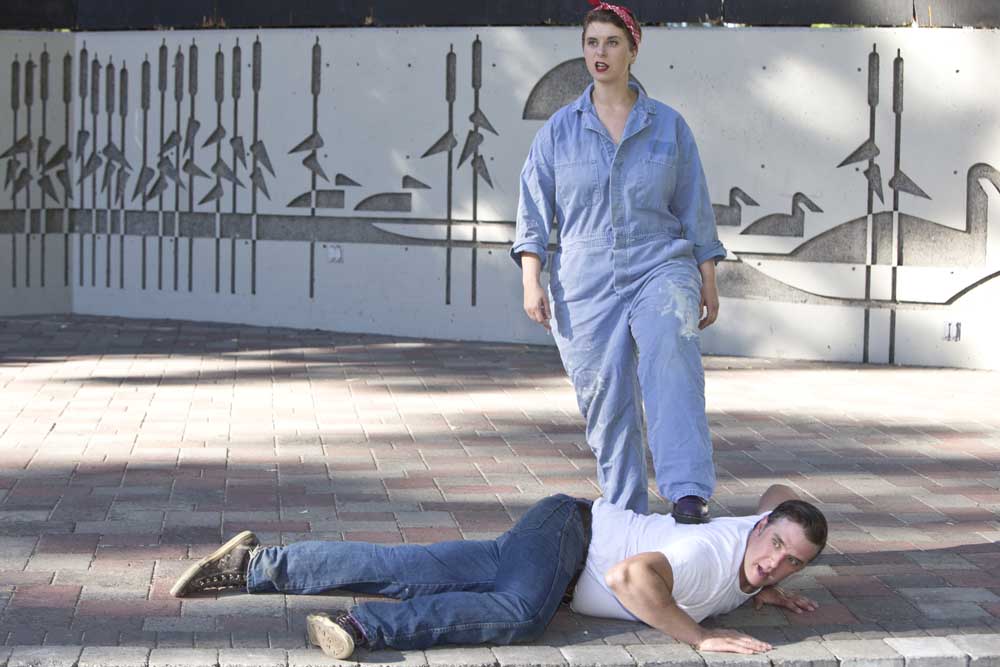Shakespeare in the park — and winery and graveyard
Published 12:00 am Thursday, July 19, 2018

- Kit Foreman as Kate, stands atop Clinton Clark, as Petruchio, while performing a scene from William Shakespeare’s “The Taming of the Shrew.” The two rehearsed in Drake Park in Bend on July 11.(Andy Tullis/Bulletin photos)
There was food flying fast and furious around Drake Park last week in Bend. Though it was a Wednesday evening, the food had nothing to do with the weekly farmers market wrapping up a short distance away — and everything to do with breaking the spirit of a newlywed woman, as the food — as well as crackling dialogue — were coming from a rehearsal of the William Shakespeare’s “The Taming of the Shrew.”
The comedy is the first production in two years from Guerilla Shakespeare Co., bringing back to Central Oregon its roving productions of works from the great English playwright. The show will visit outdoor venues in Bend, where it opens Thursday, as well as Sisters and Culver (see “If you go”). The folks behind the company, co-founded by Clinton K. Clark and Danielle Herron, tackled “Hamlet” in 2016 and “Macbeth” in 2015. (“Macbeth” was a production of Clark’s other production company, Dionysus Presents.) Guerilla Shakespeare Co. decided to sit out 2017, Clark said, because of the fierce competitor for eyeballs that was the solar eclipse.
Trending
This year, in a collaboration with Stage Right Productions, Guerilla returns with a whopper of a show. Directed by Danielle Herron, the play stars Clark as Petruchio, who as fortune would have it, is in hot pursuit of the accused “shrew,” Katharina (Kit Foreman). Kate, as she’s also called, is older sister to the winsome Bianca (Cayla Clark). So desirable is Bianca that mere mentions of her name cause the rest of the cast to sigh pleasurably.
Chase Johnston stars as the lovestruck Lucentio, smitten with Bianca from the moment he lays eyes on her. He’s joined by servants Biondello (Raechel Gilland, who is constantly, and hilariously, munching on food in every scene she’s in) and his wingman, Tranio, played by Alastair Jaques, whose booming voice proves a real asset for an outdoor performance. Lucentio and Tranio switch identities in order that Lucentio can pretend to be a Latin tutor to Bianca, whose father, Baptista (Ed Victor) will not allow her to wed before he marries off his eldest daughter, which could prove a challenge. Bianca already has two suitors, Gremio (Christin E. Sands) and Hortensio (Corey McEuin), the latter of whom also pretends to be a teacher to Bianca. As so often happens in comedies, hijinks ensue.
If you’re intimidated by Shakespeare, or just believe you are, relax. Though some points may be so quickly or colorfully expressed that they elude you, the cast does a fantastic job of conveying the points being made through their expressions and physical actions.
As Clark told this reporter in 2016, “It is in our language, and it’s understandable if you work to make it understandable. Our whole idea is accessibility,” he said. “If the actor completely understands what they’re saying, then they’ll be better able to convey it to the audience.”
At the rehearsal, several of the show’s producers and cast members expressed their awareness that the ideas of taming women and describing them as “shrews” are outdated and misogynistic. If you’re scratching your head about all the fuss: In addition to being a small rodent, a shrew is an antiquated term referring to a strong-willed, ill-tempered woman. Sour disposition or not, the idea of “taming” a person isn’t exactly recognizing an individual’s agency.
Clark went so far as to call the play controversial — which at first may seem an odd way to describe a work believed to be written more than 400 years back. However, in the age of #timesup and #metoo, it indeed does seem controversial to, for example, toss out a woman’s food in an attempt to sweeten her disposition. (Shakespeare coined many words, but apparently “hangry” was not one of them.)
Trending
In 2015, “Macbeth” was given a corporate setting, and Guerilla Shakespeare Co. once again comes through with an interesting one for this summer’s production. The play is set somewhere around 1949, and Foreman portrays Kate in a manner that is intended to, and succeeds in, call to mind Rosie the Riveter, the famed heroine/icon that illustrated American women’s role — one of strength — in the war effort.
There’s also a surprise during the performance, Clark hinted, to offset some of the show’s depictions of women.
“We’re throwing in a twist so as to make it not as misogynistic,” Clark said.
These outdoor performances will be held rain or shine. Seating is festival-style, so don’t forget to bring a blanket or low-slung chair.








